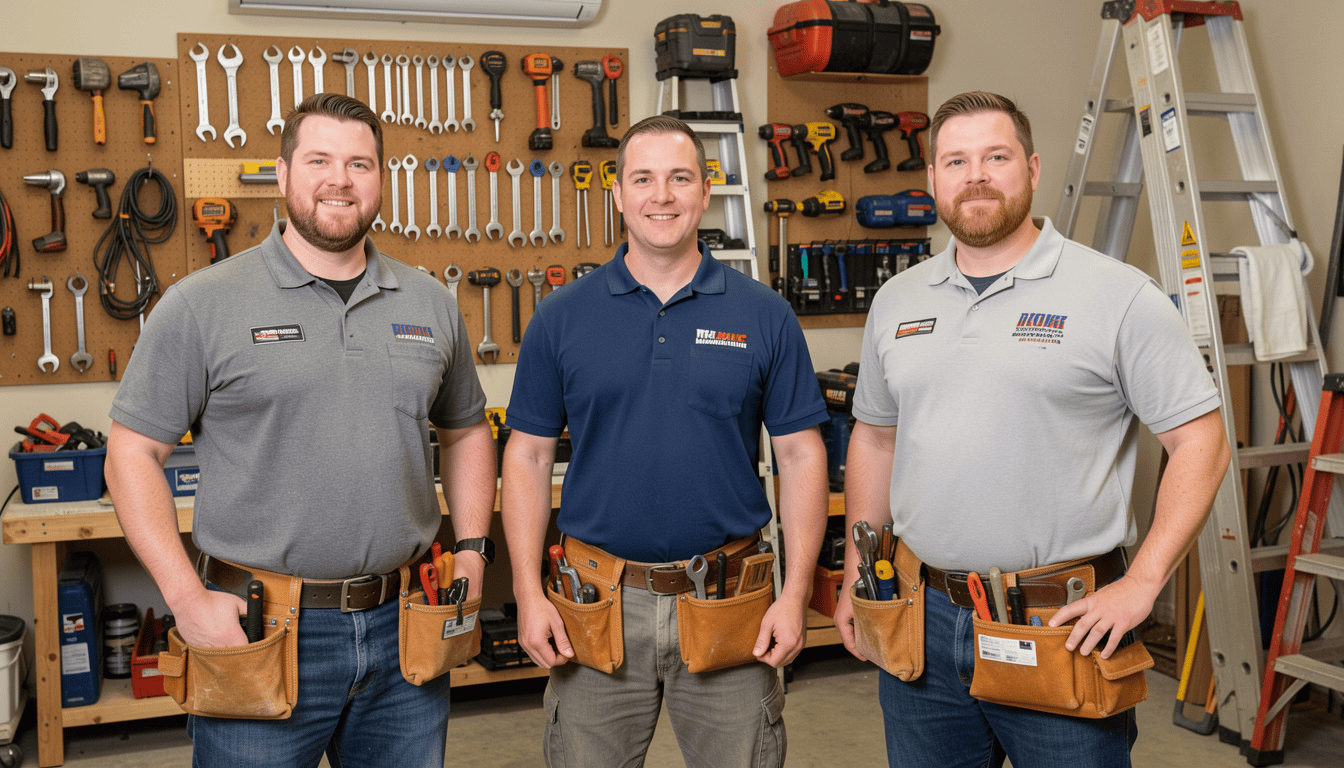Fintech Mad Libs: What Happens When You Let AI Write Your Home Improvement Sales Strategy

“To maximize renovation ROI, we’ll deploy quantum-backed bathroom financing via predictive blockchain plumbing algorithms.”
Sound crazy? That’s the point. This over-the-top, fictional AI-generated sales strategy is full of buzzwords but says nothing useful. It’s a Mad Libs of tech jargon, and it highlights a serious issue in the home improvement world: sales advice loaded with fancy fintech terms that mean zilch on a job site. Contractors don’t close deals by impressing homeowners with jargon about “blockchain plumbing algorithms”. They close deals by solving real problems in plain language. So let’s laugh the jargon, then get real about what helps home improvement contractors win jobs (hint: it’s not “quantum-backed” anything).
The Disconnect Between Tech and Trades
There’s often a huge disconnect between Silicon Valley tech-speak and the reality on a construction site. Many fintech solutions seem built for sleek boardrooms in San Francisco, not dusty backyards in St. Louis. Contractors are masters of their trade – building decks, remodeling kitchens, and making homeowners happy, but they’re often handed software and strategies that look like they’re made for bankers or coders. It’s no surprise that the construction industry has been one of the slowest to go digital. In fact, according to a McKinsey Global Institute index, construction ranks second from last (21st out of 22 industries) in digital adoption. Why? Because too often, tech tools aren’t built with contractors in mind.
Think about it: if an app or platform isn’t simple, mobile, and field-friendly, contractors won’t use it. They’re out on sites, not sitting at a desk. Nearly 48% of contractors use mobile apps for on-site work (for things like scheduling, estimates, etc.) – so any fintech tool that isn’t mobile-friendly is DOA. And if a financing platform comes loaded with convoluted menus or requires an engineering degree to operate, a contractor will rightly say, “I’ve got houses to build; I don’t have time for this.” As one industry analysis put it, construction pros can be tech-averse when solutions are complex or fragmented. They need tools that speak their language.
The bottom line is that fancy tech jargon doesn’t impress homeowners, and it sure doesn’t make a contractor’s life easier on the job. If a tool or sales strategy isn’t grounded in the day-to-day reality of running a home improvement business – driving between job sites, managing crews, dealing with clients’ questions, then all the “innovative fintech synergy” in the world won’t help close a sale.
Top 5 Buzzwords That Don’t Help You Sell
Let’s turn those absurd “Mad Libs” buzzwords into something constructive. Here are five common fintech or tech buzzwords that get thrown around in sales strategy talk – but why they won’t help you sell a kitchen remodel. (Contractors, get your buzzword bingo cards ready!)
- Omnichannel Experience – In the fintech world, omnichannel is a legit term, referring to a seamless experience across all channels (store, phone, web, etc.). Great for a retail bank, but for a contractor, your “channels” are probably your phone, your website, and in-person meetings. Homeowners aren’t expecting a TikTok chatbot and a VR showroom from you. They just want you to show up on time and maybe answer a text. Talking about “omnichannel customer journeys” to a homeowner will get you blank stares. Focus on being responsive and available (pick up the phone, answer emails promptly) rather than dropping this buzzword.
- Neural Credit Scoring – This one sounds ultra-high-tech (and it is). It refers to AI-driven credit scoring models (neural networks and all that), which fintech lenders might use behind the scenes. But here’s the thing: homeowners do not care how their loan approval happens, only if they’re approved and on what terms. Telling a client, “Good news, our financing uses neural network scoring!” won’t reassure them – it might worry them that some robot is deciding their fate. Instead of bragging about machine learning algorithms, keep the financing conversation simple: “We work with lending partners who can approve you on the spot for a monthly payment that fits your budget.” Leave the nerdy details to the underwriting team.
- Hyperautomation – This mouthful is a favorite in tech circles. IBM defines hyperautomation as “automating everything that can be automated” with AI and bots. Wonderful for cutting corporate costs, but how does that help a contractor on a sales call? If a financing platform brags about hyperautomation, it hopefully means your homeowner’s loan application gets processed faster without human bottlenecks. But you don’t need to say the word. All your customer cares about is: can they get an answer now? Focus on speed and ease, not the term “hyperautomation”. Telling Mrs. Smith that her financing is ready in 90 seconds will win you the job – explaining that it was due to “a hyperautomated, AI-driven workflow” will just weird her out.
- Blockchain (for Everything) – Blockchain, the tech behind cryptocurrency, gets tossed into pitches for everything these days. Secure ledgers! Decentralized finance! In reality, blockchain has near-zero relevance to a home improvement sale. Maybe some fintech somewhere uses blockchain to verify loan transactions – that’s fine, but it’s invisible to you and the homeowner. If you ever find yourself saying, “Our bathroom remodel financing uses blockchain,” stop and ask why you’re saying that. Unless your client is a Bitcoin enthusiast (in which case, good luck), this buzzword won’t help you close. Skip it. Emphasize things that matter to homeowners: “We offer secure, reputable financing options” – that’s enough. They care that it works, not that it’s on a blockchain.
- Quantum AI Predictions – We put this one in our opening joke, and it’s an exaggeration. But it symbolizes all the ultra-futuristic tech concepts that sound impressive and do absolutely nothing in a kitchen table conversation with a client. Quantum computing, predictive analytics, big data synergy – these might power some cool tools behind the scenes. They might even help a finance company offer better rates or approvals. But if you lead your sales strategy with “predictive analytics show a 27% chance you’ll choose the deluxe windows,” you’ve already lost the human connection. Home improvement is still a people business. Homeowners care about trust, quality, and affordability, not the Star Trek technology that might be humming in the background.
In short, buzzwords can be fun (or baffling) filler, but they don’t close deals in the home improvement world. So let’s talk about what does.
What Works: Simplicity, Speed, and Trust
After scraping off the jargon, successful contractor sales strategies boil down to a few simple things homeowners care about. Here are three pillars of a tech-enhanced sales approach that will help you sell more jobs:
- Keep It Simple (Clarity Over Jargon): Whether it’s your pitch or your financing options, simplicity wins. Homeowners appreciate clear, easy-to-understand choices. For example, when presenting a project estimate, frame the cost in straightforward terms, like monthly payments, rather than an intimidating lump sum. A National Association of the Remodeling Industry (NARI) blog notes that discussing affordable monthly payment options instead of the total project cost can significantly comfort customers and avoid sticker shock. It’s true, saying “This will cost $18,000” often causes gasps, but “This could be about $150 a month with financing” invites a conversation. Nearly 48% of homeowners prefer to finance major renovations rather than pay all at once (read more here), which means almost half of your clients want to hear about a financing option. By keeping the discussion focused on how you can make the project affordable and stress-free (and skipping needless complexity), you’re speaking directly to their needs.
- Speed Matters (Instant Approvals, Instant Gratification): In our on-demand age, patience is scarce. When a homeowner is excited about a project, any delay – especially a financing delay – can kill the momentum. Fast financing approvals and a smooth process are often the make-or-break factor in closing a deal. A PwC consumer lending survey found that aside from getting a good rate, borrowers say the most important factor in choosing a lender is speed and simplicity of the process. Think about that: speed ranks above fancy features. For home improvement sales, this means you need a financing solution that gives decisions in minutes, not days. If a client has to wait a week to hear back about a loan, you might as well hand them your competitor’s card in the meantime. On the other hand, if you can pull out a tablet and say, “Let’s get you approved right now,” and have an answer before you pack up your tape measure – that’s a game changer. Quick approvals not only make customers happy, but they also dramatically shorten your sales cycle, letting you schedule the job on the spot. Point-of-sale financing platforms exist now that integrate multiple lenders and can produce real-time offers. Use them. As a contractor, speed is your friend: the faster your client gets financing, the faster you get a yes and start the project.
- Trust and Transparency: Home improvement is built on trust. Homeowners are letting you into their homes – they need to feel comfortable with you and any service you recommend, including financing. So any tech or fintech tool you use should enhance your credibility, not undermine it. Offering a reputable financing option, for instance, can increase the trust a homeowner has in you. (If you’ve ever had a client say “No thanks, I’ll talk to my bank,” it might be because they weren’t confident in the options you presented.) According to a NARI industry partner report, contractors who offer trusted financing stand out from competitors and increase their credibility in the marketplace. The key is to present financing as a helpful service, not a hard sell. Be transparent about the terms: “We work with a financing platform that partners with leading banks/credit unions. It’s a secure, no-obligation application, and it won’t hurt your credit to check your rate.” When homeowners see that you’ve done your homework to offer them a solid solution, it builds trust. They feel you’re looking out for them, not just trying to upsell. And trust is what turns a one-time customer into a source of glowing referrals.
In essence, simplicity, speed, and trust are the antidotes to fintech buzzword fever. If your sales strategy and tools deliver on those three, you’re in great shape. Now, let’s look at how one solution ties all this together in a contractor-friendly way.
Financing That Fits the Conversation
“FinMkt’s embedded lending platform is built for contractors, not coders. It’s fast, mobile-friendly, and designed to help you offer financing right when the homeowner is ready to say yes.”
That quote pretty much sums it up. FinMkt (a fintech company focused on point-of-sale lending) realizes that contractors just need a practical, easy financing tool, not a crash course in Silicon Valley buzzwords. FinMkt’s platform is all about integrating financing into your sales conversation seamlessly – exactly when and where it can help you close the deal. No sending the homeowner to a bank branch, no clunky paperwork; it’s embedded right into your process on a smartphone or tablet.
Why does this matter? Because we’ve seen the difference it makes. Contractors using modern embedded lending platforms like FinMkt are reporting significant boosts in their sales performance. For instance, contractors who offer financing through such platforms achieve higher close rates and larger projects on average. FinMkt’s own data shows that their contracting partners see about 18–20% higher close rates and 30–50% bigger project sizes when financing is presented as part of the deal (read more here). That aligns with industry studies as well; an Acorn Financing study likewise found offering financing can lift close rates by roughly 18% and increase average job size by 30%. Essentially, financing turns fence-sitters into paying customers and small projects into dream projects. Instead of walking away from a $20,000 bathroom remodel because of cost, a homeowner might eagerly sign up for a $30,000 remodel when they see a convenient payment plan.
There’s also a real impact on sales speed. When financing is embedded and instant, you remove the biggest source of delay in closing a sale. A Harvard Joint Center for Housing study found that projects with financing options close 2.5 times faster on average (read more here). And no wonder, a client who might take weeks “thinking about how to afford it” can decide on the spot when you solve the affordability question for them. The same study noted that 78% of homeowners would take on larger renovation projects if financing was readily available. In other words, eight out of ten clients might upgrade to the “full deluxe remodel” if you make it easy for them to pay over time. That’s the opportunity FinMkt’s platform is built to capture, in a way that’s useful for you as a contractor.
A key difference with a contractor-first platform like FinMkt is its simplicity and support. It’s designed so that even if you’re not “techy,” you can use it without a hitch. The interface is straightforward and mobile-friendly (remember, 48% of contractors rely on mobile apps in the field). Approvals often come back in seconds, keeping that momentum alive. And it’s not just about getting a yes/no – FinMkt’s multi-lender approach means your client gets multiple offers and can choose the best rate/term for them, all through one application. That makes the financing part of your sales talk feel like a natural extension of the project discussion: “Here are a couple of financing options that could work – 0% for 12 months with XYZ Bank, or a low monthly payment over 5 years with ABC Lender. Which do you prefer?” Now you’re not a salesman, you’re a problem-solver. The homeowner feels in control and supported. Meanwhile, you’re closing more deals, faster, and often for larger scopes of work.
Most importantly, FinMkt keeps the focus on the homeowner’s experience. The technology (dare we say the neural scoring algorithms and hyperautomation behind the scenes) is all there, but it’s invisible and irrelevant to the homeowner – and to you. What you see is an easy tool that lets you say, “Yes, we can handle the financing for you right now.” What they see is their dream project moving forward without a headache. And that’s what counts.
Ditch the Jargon, Win the Job
At the end of the day, nobody hires a contractor because they used the word “omnichannel” in their pitch. Homeowners hire you because you understand their needs and can deliver results within their budget and timeframe. So ditch the jargon and focus on what works: clear communication, speedy service, and tools that remove friction (not add more). The absurd “AI-written” sales strategy we started with got a laugh because it’s so far from what real homeowners want. It’s a cautionary tale: don’t let tech-talk overshadow the human touch and common sense.
As you evaluate tools to help your business – CRMs, financing platforms, marketing apps – keep that contractor filter on. Will this help me sell more, do the job faster, or delight my customers? If not, move on. If yes, great – just make sure it’s something you and your team can use in the field. The good news is, fintech in home improvement doesn’t have to be all buzzwords. There are solutions (like FinMkt’s embedded lending platform) that are built with a contractor’s reality in mind. They’re practical, intuitive, and help you close sales rather than complicating them. These are the kind of tools that let you offer, say, “kitchen financing” without turning it into a quantum physics lesson.
So, the next time you hear a pitch full of blockchain-this and AI-that, you can chuckle and then get back to what matters: helping your clients improve their homes. Cut through the nonsense, embrace tech that keeps things simple, and you’ll find yourself closing more deals (and probably enjoying the process a lot more). In the world of home improvement sales, being contractor-savvy beats being high-tech savvy every time. Ditch the jargon, deliver the goods, and you’ll not only win the job, you’ll win a customer’s trust for life. And that’s something no AI-generated gibberish can ever do.

















